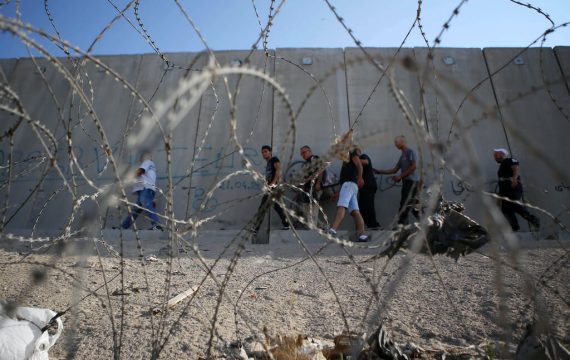Amnesty International’s February 1 report on apartheid in Israel puts the spotlight on Israel’s character as a state. The report comes at a crucial juncture in international scrutiny of Israel for its original takeover of Palestine’s territory, its expulsion of Arab population, and its erection of a discriminatory legal order.
Coming on the heels of similar analyses by Human Rights Watch and by the Israeli rights organization B’tselem, the Amnesty International report does not simply point to violations of various human rights. Instead, it focuses on the totality of violations to show Israel to be a criminal enterprise. That orientation is reflected in the report’s title, “Israel’s apartheid against Palestinians: a cruel system of domination and a crime against humanity.”
The point of all three reports is that the aim of Israel’s government is unlawful domination of the Arab population. B’tselem was the first, with its January 2021 report “A regime of Jewish supremacy from the Jordan River to the Mediterranean Sea: This is apartheid.” Amnesty International followed in April 2021 with a report headed “A Threshold Crossed: Israeli Authorities and the Crimes of Apartheid and Persecution.”
Now comes Amnesty International, confirming this analysis with its own research. Its report may have more impact, if only because Amnesty International enjoys more international visibility than the other two groups. Amnesty International is often cited by the United States as an authoritative source when the U.S. State Department criticizes other governments for violating rights. The importance of the Amnesty International report, however, lies less in the organization’s status than in the fact that one now has three major rights organizations arriving at the same conclusion about Israel.
The Amnesty International report has been condemned by Israel’s government, which denies the report’s characterization of the country. The report was labeled as “false, biased and anti-Semitic” by Israel’s Foreign Minister Yair Lapid.
The vehemence of this retort can be explained by the fact that the conclusion reached by the three human rights organizations may have serious consequences for Israel. Apartheid is a crime for which perpetrators may be prosecuted and jailed. The timing of the Amnesty International report is important, coming after the hostilities between Israel and Gaza of May 2021.
That concurrence matters because in July 2021, the United Nations Human Rights Council appointed a three-member commission of inquiry to examine crimes committed in connection with those hostilities. The Human Rights Council wants to know not only about crimes in the immediate hostilities, but about crimes related to what it called the “root causes” of those hostilities.
The Human Rights Council is leaving it up to the commission of inquiry to ascertain just what those “root causes” were. It is asking the commission not only to collect data but to identify individual perpetrators. The commission is tasked to prepare criminal dossiers on persons who might be subject to being indicted. Apartheid is a crime that falls under the broader crime category “crimes against humanity,” prosecutable in the International Criminal Court.
Importantly, the International Criminal Court’s Prosecutor is currently investigating international crimes in Israel and the occupied Palestinian territories. To date, the Prosecutor has not inquired into apartheid, but the three reports give him a solid basis to orient his investigation in that direction.

VIDEO: Nakba Survivors Speak: “The sky was our blanket and the ground was our mattress”
The three reports provide an opening for Palestine advocacy organizations, in particular because of the formation of the commission of inquiry. Palestine advocacy organizations can propose to the commission of inquiry a variety of Israeli policies as “root causes” of the 2021 Gaza-Israel conflict. Perhaps the most important one is Israel’s refusal to offer repatriation to the Arab families expelled from their home areas in Palestine in 1948. Given that the majority of Gaza’s inhabitants are from families that were expelled in 1948, the refusal to allow repatriation qualifies as a “root cause” of the May 2021 hostilities.
The perpetrators of the 1948 expulsions of Arab families are no longer living, so they cannot be prosecuted by the International Criminal Court. But their successors who deny repatriation to those Arab families occupy high positions in Israel. Their denial of repatriation qualifies as a “crime against humanity” as defined by the International Criminal Court. Human Rights Watch in its report calls the refusal to repatriate “persecution” and “apartheid,” both of which are sub-categories of “crime against humanity” in the Statute of the International Criminal Court.
The commission of inquiry has just now formed and has issued a “terms of reference” document to guide its work. Commission of Inquiry The commission is asking the public to submit information. Information can be submitted in English, Arabic, or Hebrew. In its “terms of reference,” the commission provides an upload feature to submit information. It also provides an e-mail address for questions about how to submit information.
Recommended
Ever since 1948, the United Nations has called on Israel to repatriate persons displaced in that year. However, no concrete action has been taken by the international community to force Israel to comply. Now for the first time an international procedure has opened whereby Israeli officials responsible for Israel’s policy of denying repatriation can be brought to account. The commission of inquiry will be cooperating with the International Criminal Court, preparing criminal dossiers that the Court’s Prosecutor can use to prepare indictments.
Apart from whether any actual indictments are ever issued by the International Criminal Court for denial of repatriation, advocacy efforts in that direction hold the prospect of changing the discourse around the 1948 Nakba and the entire Palestine issue. Repatriation will come to be seen not simply as an agenda item for Israeli-Palestinian negotiations. Instead, the Israeli officials who refuse to repatriate will be seen as criminals.
The commission of inquiry is made up of three members, who have already been appointed. All three are seasoned human rights advocates. All three are well schooled in the history behind the establishment of Israel. The three human rights organizations in their reports have provided solid factual information that is now available to the commission. What could be particularly compelling for the commission is submissions from Palestinians who are from families that were forced out of their home areas in 1948.
Such submissions will make clear that the crime of denial of repatriation has real victims. Submissions could explain the circumstances under which the family left in 1948. Submissions could explain the hardships their families encountered subsequently. For those whose place of refuge is Gaza, submissions could include information about the quality of life in Gaza, and why the flow of large numbers of Palestine Arabs into Gaza in 1948 is a “root cause” of the hostilities of May 2021.





